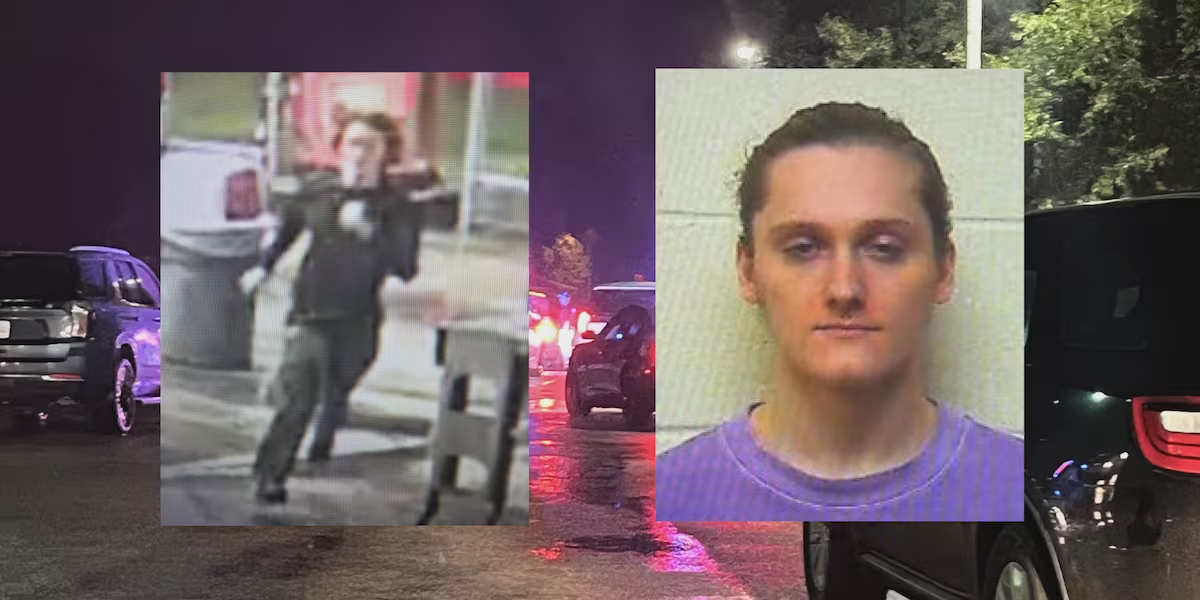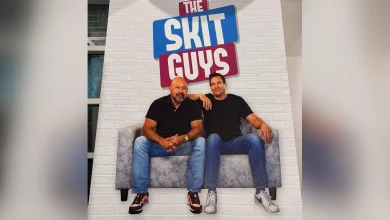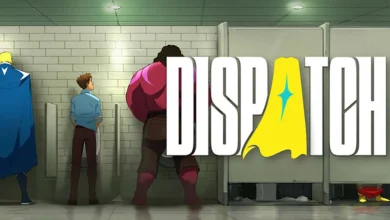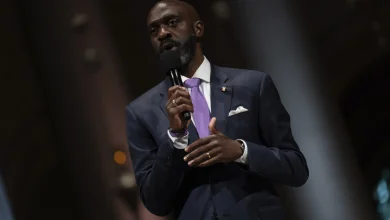State of Shock: Michael Shannon and Matthew Macfadyen on Death by Lightning
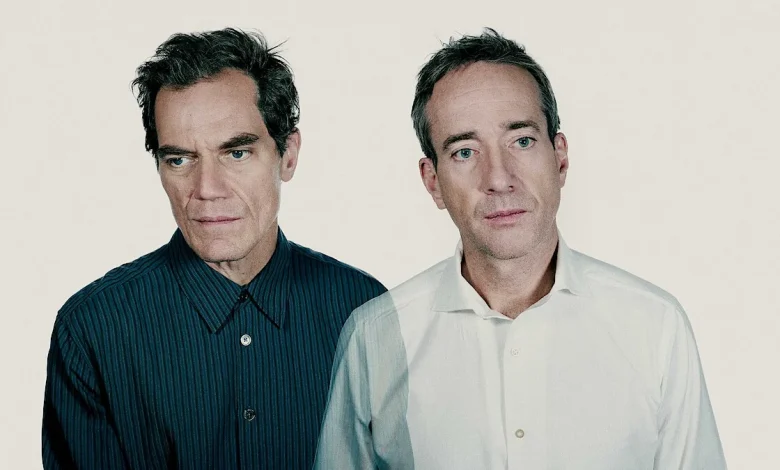
This article contains major character or plot details.
Death by Lightning is the story of two men: an American president, and the man who shot him.
The new limited series follows President James Garfield as he rises from the depths of poverty to the pinnacle of American politics — only for his presidency to be cut short by a delusional office seeker named Charles Guiteau. Based on Candice Millard’s 2011 book Destiny of the Republic, Death by Lightning is an intimate drama with nationwide consequences.
“Candice really honed in on this parallel structure, where she was constantly weighing the president, this great man, James Garfield, against the man who would come to kill him, Guiteau,” series creator and writer Mike Makowsky tells Tudum.
To play these two figures, Makowsky and director Matt Ross turned to a pair of titanic performers: Michael Shannon and Matthew Macfadyen. “I think Michael Shannon is just one of the most talented actors of our generation,” Makowsky says. “[And] casting an actor like Matthew Macfadyen, I think, will hopefully provide an access point for viewers who probably will be coming in with preconceptions about how they think they’re going to feel about Guiteau.”
Shannon and Macfadyen sat down with Tudum to discuss the process of bringing Death by Lightning to life. Read on for more.
It’s not every day someone asks you to play an actual US president.
Michael Shannon
How much did you know about this time in history before starting work on the series? Did you do research beyond reading Candice Millard’s book?
Matthew Macfadyen: I knew nothing about it. I read Candice’s book and jumped in from there. I have a funny relationship with research. It’s an exercise in letting go of some of it and forgetting some of it because you can’t play it. So I read Candice’s book, and if you have a great script, that’s all you need, really.
Michael Shannon: It was kind of our textbook. It’s definitely what Mike Makowsky was working off. It was his bible for the thing. There was a big, fat biography of Garfield by a fellow named C.W. Goodyear. I read that. That was very helpful. Betty [Gilpin] showed me some letters that James and Lucretia [Garfield] had written to each other over the years, and those were very helpful. And just reading speeches. you can fish around on the internet and find all different kinds of oration that Garfield gave.
What attracted you to this series, and these characters?
Shannon: Well, I was being asked to play a president, so that’s momentous in and of itself. It’s not every day someone asks you to play an actual US president. I like learning on the job. When I was going to school, I didn’t find things like this so interesting, but when you’re acting out a historical story, you’re getting to experience it in so much detail, and you’re actually trying to inhabit it and understand what it was like in a very sensory way. I wish, honestly, that’s how history was taught.
Macfadyen: It’s just a great story, a great part. It’s something I knew nothing about. I hadn’t played a part like [Charles Guiteau] before. I really loved meeting Matt Ross, our director, and I admire his film Captain Fantastic, which I thought was brilliant. So that was a big draw, and I knew Mike [Makowsky] was going to be involved, which was thrilling. It was just a wonderful thing to embark on.
President Garfield is often viewed as an inconsequential president because of how brief his tenure was. But the series and the book make clear he’s a very compelling figure. Michael, what did you want to capture about his character?
Shannon: His compassion and his curiosity about other people, and his genuine interest in improving the health of our country. America was a real mess when he became president. We had not picked up the pieces from the Civil War. There was still a lot of tension and disarray, and it was a monumental challenge to be president at that time. And I really think, had he lived on, he would’ve done it because he understood that being a president is an act of servitude, it isn’t an act of power or control. It’s being a public servant, a civil servant.
On that note, he insists throughout the series that he doesn’t want to be president, but he also gives this convention speech that’s very stirring and inspiring. It feels like he does it for a reason. What do you think he wanted out of his political career, and how did you play that?
Shannon: I think when he gave the speech, he was just telling the truth. That was the truth. He looked around the room, and he said he had spent a lot of time going around the country, a lot of time on the battlefield. He was just drawing on his experiences. I think he couldn’t help himself.
To say that he was devoid of ambition probably would be a naive thing to think, but I mean, what difference does it make at the end of the day? Mike Makowsky, the writer, he found that thematically more interesting than I did. It didn’t really interest me that much, to be honest. It’s really more about what his intentions were. I mean, it’s healthy to have some amount of ambition. If you don’t have any interest in doing anything, then why are you alive?
Charles Guiteau is a character who is funny as often as he is threatening. Matthew, how did you balance the tone of that performance?
Matthew Macfadyen: You have trust in your director, and we had a great director in Matt Ross. I’ve rarely enjoyed collaborating with somebody so much as Matt. It was just a lovely process with him. You’d say, “Well, in this scene there, should we make him a little more grotesque and a little more unpleasant?” And then we’d dial it up and down in different takes. Often, [Guiteau is] very sweet and very sympathetic and quite childlike, and we’d play with that.
Tell us about working with Betty Gilpin on building the show’s central relationship between Garfield and his wife, Lucretia, the First Lady.
Michael Shannon: Betty did a lot of research and read a lot of their letters back and forth to each other. She actually gave me quite a few of them to look at.
I think classically in a narrative like this, the wife might be relegated to some sort of supporting role or whatnot, but Betty made it very clear from the get-go that that’s not how she was approaching it. And I honestly think that was more accurate, based on the research I’ve done, to what the truth of the situation was, which is that they were very much working in tandem, that James would never do anything without running it past her first. And that, much like Jimmy and Rosalynn Carter, there was just a real deep love and respect between the two of them.
All his energy, all his eggs go into the Garfield basket, and that becomes his world.
Matthew Macfadyen
Betty’s super smart and funny, and we actually would do a bit of improv, which is sometimes unusual for television. A lot of times they want you to stick to the script. So we had some latitude, thanks to Matt, to really create some of that ourselves.
Matthew, what was it like playing a transient character like Charles Guiteau? What drives him?
Macfadyen: He’s got no fixed abode. He’s got no money, can’t hold down a job. He’s not really good at anything. He wasn’t terribly well, I don’t think. And he kept staying in rooming houses and running out of money and going to the next one. That’s the kind of guy he was.
And then he finds Garfield and becomes obsessed with him. All his energy, all his eggs go into the Garfield basket, and that becomes his world. And when Garfield’s elected president, Guiteau really, really believes that he’s responsible and he’s the key to his success, and so then of course, he feels very let down and betrayed by Garfield.
Tell us about working with the rest of the cast.
Shannon: I’ve known Nick Offerman [who plays Chester A. Arthur] since I was a teenager. We both started out doing Chicago theater. He had a company called Defiant Theatre, and I was in a company called A Red Orchid Theatre, and we rubbed elbows in the Chicago theater scene for a number of years. We were in a Foreigner music video together. That’s not a joke.
My first movie with Shea [Whigham, who plays Roscoe Conkling] was Tigerland. I’ve done a heap of movies with Shea, and I know his brother, Jack, and his whole family, so it was like an old friends club.
I had never worked with Bradley [Whitford, who plays James Blaine] before, but his missus, Amy Landecker, I’ve known Amy since I was a teenager in Chicago theater. So there was a real kind of mind-blowing synergy to all that.
Macfadyen: There wasn’t a scene that I didn’t really look forward to and enjoy playing in this show, and that’s not always the case. Some scenes you think, “OK, how are we going to make this work?” But they’re also fun and quite dynamic because Guiteau is always wanting something, he’s always after something, he’s always reaching for something, and he’s always in action. There’s nothing flaccid about him. He’s always desperate for attention or a job or for someone to read his speech that he’s written.
So personally, it was just a real treat to work with all these amazing actors. That was the real joy of it for me. A lot of it is just Charlie on his own, and then annoyingly I only had one scene with [Michael], and then a little one was Shea and a couple with Betty. It’s sort of tantalizing, but it was great.
The two of you share a single scene together. What was it like filming that sequence?
Macfadyen: It was really fortunate where it was scheduled, which was at the end of the shoot, one of the last scenes either of us had, which is great because you never know, you shoot everything out of sequence.
So it was wonderful. Guiteau just wants to get to Garfield and get his advice and just to be in his presence, I suppose. And so it was building and building and building for Guiteau to this moment. I remember the scene kind of taking care of itself when we actually shot it.
Shannon: God, man, you were vibrating when you came in there. You had your energy, you were on another plane. I was like, “Man, this guy just showed up to knock this out of the park.”
But I remember I said to Matt, because I’m usually behind my desk when folks come into [Garfield’s office], I said, “Matt, I think this would be cool if we’re over at my little table where I play chess so that there’s not this big hunk of wood between me and Charles.” It would’ve been so different. I liked making that subtle shift.
Michael, tell us about filming Garfield’s convention speech.
Shannon: Well, we actually shot it twice. We shot it once, and then we got through. There was a lot to do in that space, in that sequence. We got through it. It looked like we were going to have a little extra time. I had had a few days to let it settle in more. And then something happened with Biden while we were shooting that. I think that’s when Biden pulled out.
And so I went to Matt Ross and I said, “Is there any way, if we have extra time, since we have extra time, we could revisit that speech?” Because it was so overwhelming to deliver that speech. It’s hard to believe that just came from one human being, that amount of perception, insight, wisdom. It’s astonishing. So I perhaps felt a little unworthy the first time around. I don’t know.
But anyway, we had the time, so Matt’s like, “Sure. We got it the first time, but if we do it and I don’t see any difference, then that’s fine because we have the time anyway.” And to be frank, I don’t even know what you’re watching when you watch the show. I don’t know if you’re watching the first time I did it or the second time I did it, and I don’t really care. But I do know I enjoyed getting the opportunity to do it again because it was much more articulate of a statement than I would ever be capable of making. So it’s always nice to ride on somebody’s coattails in that regard.
It sounds like Matt is a very flexible director. What was it like working with him?
Shannon: Matt’s one of my favorite directors I’ve ever worked with. I give Matt the lion’s share of the credit for making this as compelling a program as I believe it is. He was so devoted, and he put so much research into it.
He’s also an actor. It’s always nice when you work for a director who’s acted, just because they know how it can be a difficult process sometimes, and [they know] some of the anxiety you’re dealing with because there’s always anxiety. And we all felt, I think, a certain amount of pressure because we knew how important the story was, and we wanted to get it right, but we also wanted to make sure that it was dynamic and didn’t feel like a history lesson.
And Matt really rode that edge remarkably well because I think he never lost sight of the thing that’s most compelling about this story: the psychological component of it, not who’s right, who’s wrong, this happened, that happened. It’s about the psychology of every character, not just the one who seems to be batshit crazy, but the psychology of all the characters in the room.
Macfadyen: I couldn’t agree more. I trusted Matt implicitly, and it was great. It’s a lovely feeling as an actor when you’re not afraid of being brave. And that’s the trick, really. You just want someone who takes away any fear, any worry, and you can try things, and some things don’t work, and that’s as it should be. My performance as Charlie is inextricably bound up with working with Matt. I think all of us loved him.
The series is about political violence, corruption in politics, the importance of medicine. These are all things with plenty of modern relevance. What do you both want audiences to take away from this?
Shannon: I think it’s important to have a lot of empathy for Charles Guiteau. I don’t think Charles Guiteau is a villain. I think it’s important to consider that question, “Well what would have happened if he hadn’t done it?” Let’s think about that together. This show is a rumination, a meditation, and an exploration of why people do things like this because they’re still doing them, and it’s over a hundred years later. So come on now.
Macfadyen: I think watching somebody like James Garfield onscreen ought to be really inspiring. He was a kind of beautiful guy, and he was an exemplary public servant — thoughtful, empathetic — a fundamentally decent man. It wasn’t about him. It was about the office and helping the citizens of the United States. That’s a good takeaway, I’d say. Something to aspire to, isn’t it?
Death by Lightning is now streaming on Netflix.

